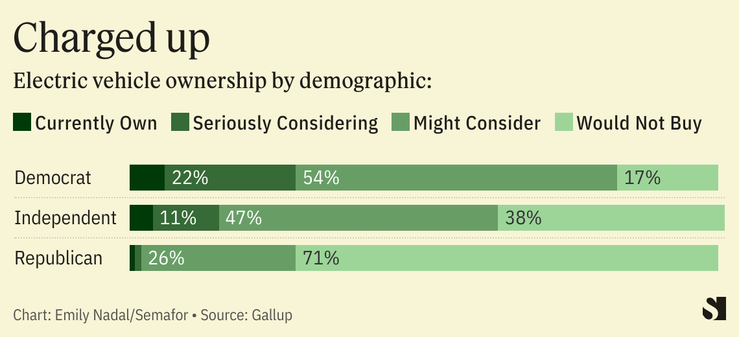The News
Elon Musk might be one of them now, but Republicans still say they aren’t open to buying electric cars.
According to a new poll by research and analytics firm Gallup, a whopping 71% of GOP voters say they would never purchase an EV. That’s compared to 38% of independents, and 17% of Democrats. The group finds that just 4% of Americans currently own an EV. The new survey comes just as the Biden administration rolls out major new pollution regulations aimed at speeding up the car market’s transition to electrics.
Car companies have launched an advertising blitz portraying electric cars and trucks as high-end performance vehicles instead of emphasizing their eco-friendliness. But Gallup finds that Americans’ attitudes toward EVs are still very much tied to the way they view global warming. Among those who worry “a great deal” about climate change, 79% say they’d consider an electric ride. Of those who say they aren’t worried about climate change at all, 77% wouldn’t buy one.

A survey released this week by the Associated Press and NORC contains similar findings. About 41% of all Americans and 56% of Democrats said they would at least consider an electric option for their next car purchase. That number falls to just 27% among Republicans.
The most common concerns among EV skeptics are still mundane issues like cost and the availability of charging stations, the AP poll finds. But 38% of takers said that the cars don’t align with their personal values.
In short, conservatives appear to be standing athwart the Tesla production line, yelling stop.
In this article:
Jordan’s view
In theory, disinterest from conservative car buyers could make it somewhat harder for the Biden administration to hit its goal of ensuring half of all new car sales are electric by 2030. But there are also reasons to think it may not be that much of an obstacle. First, for the time being, EV sales are surging — they jumped 65% in 2022, according to Cox Automotive, and now make up 5.8% of the vehicle market.
Second practical barriers to EV ownership like cost and charging availability are expected to lower over time. That’s thanks partly to subsidies Democrats included in the Inflation Reduction Act. Car companies have also begun slicing their prices to juice sales; Tesla cut the cost of some models by 20% in January, and seems to have seen a sales bump as a result.
EVs could lose a bit of their political valence in the future. Some conservative politicians have begun warming to electrics as automakers have gone on a factory building binge that’s brought new car and battery plants to states like Kentucky, Georgia, and Tennessee. Musk’s right-wing turn might not hurt, either.
But most importantly, shoppers simply might not have a whole lot of choice in the matter.
The Biden administration is unveiling ambitious new tailpipe regulations on Wednesday designed to ensure that two-thirds of all new cars and a quarter of heavy trucks on the market are electric by 2032. Meanwhile, car companies have already begun spending vast sums of money retooling their production lines as states like California, New York, Massachusetts, and New Jersey prepare to ban the sale of new gasoline-powered cars by 2035. (Europe had similar plans, until Germany pushed through a loophole). Several top automakers, including GM and Mercedes, are also planning to phase out the combustion engine in the coming years.
Between the new rules and massive investments car makers are making in production facilities, the EV transition is gaining momentum that could be hard to reverse. Like it or not, consumers may just find themselves having to pick from a dealer lot full of EV’s.
“The automotive market has already begun to shift,” Corey Cantor, an electric vehicles analyst at BloombergNEF told me. “Consumers may find themselves at a point next decade where the EV offerings are plentiful thanks to all of these factors, and the remaining pure internal combustion engine vehicle offerings are limited.”
Room for Disagreement
Some auto executives have argued that Biden’s 50 percent goal is unrealistic due to a lack of demand. “I don’t think the market is ready,” Jack Hollis, Executive Vice President of Sales at Toyota Motor North America, said last year. “The consumer is not screaming, ‘30% or 40% by tomorrow.’” Separately, EVs might not be able to take over the market if companies can’t scale up battery production or critical mineral mining sufficiently.
The View From Gallup
Gallup analyst Megan Brenan notes that “Americans aren’t always the best judge of their future behavior when it comes to technology. For example, as recently as 2000, a quarter of Americans thought they’d never own a smartphone.”


